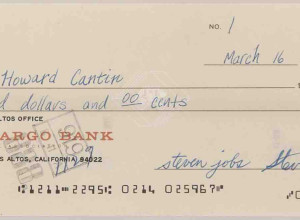Book Review: "The History and Uncertain Future of Handwriting"
Perhaps it is too obvious to say, but handwriting tugs at the heartstrings of book collectors. We look for and place value on signatures, inscriptions, and marginalia. So the idea that handwriting might someday be obsolete is unsettling. Put in context, however, bibliophiles will note some fascinating parallels between this divide and the one that Gutenberg faced five hundred years ago. Anne Trubek, editor in chief of Belt magazine, publisher of Belt Publishing, and sometime contributor to Fine Books, deftly provides that background in her new book, The History and Uncertain Future of Handwriting (Bloomsbury, September).  From a visit to the Morgan Library to behold (and hold) cuneiform at the book's beginning to a visit to the Ransom Center to examine digital handwriting and contemporary authors' archives near the book's end, Trubek makes manageable what could be an unwieldy topic. She even explains how a goose quill pen is made! And who knew that Platt Rogers Spencer, developer of Amerca's ornate 19th-century penmanship, took his inspiration from nature, fashioning his "a's, b's and c's from the shapes for rocks, branches, and lakes that he looked at every day"?
From a visit to the Morgan Library to behold (and hold) cuneiform at the book's beginning to a visit to the Ransom Center to examine digital handwriting and contemporary authors' archives near the book's end, Trubek makes manageable what could be an unwieldy topic. She even explains how a goose quill pen is made! And who knew that Platt Rogers Spencer, developer of Amerca's ornate 19th-century penmanship, took his inspiration from nature, fashioning his "a's, b's and c's from the shapes for rocks, branches, and lakes that he looked at every day"?
Trubek is well-acquainted with the question that some historians and history-minded enthusiasts ask, "How can you read cursive if you cannot write it?" To which she responds, "The truth is, most of us already cannot read 99 percent of the historical record." A compelling statement that is supported by her (too brief) interview with Heather Wolfe, curator of manuscripts at the Folger Shakespeare Library and an expert in indecipherable historic scripts. Her point is that the shift away from handwriting is part of a long-term process, and it dredges up cultural and social anxieties that deserve to be considered in this debate.
That said, those who believe that teaching handwriting--a hot-button issue in American education--remains important will still find the book enjoyable to read because Trubek's approach is even-handed; she seems less interested in converting readers than in offering up a thoughtful survey of a fraught subject.
Image via Bloomsbury Publishing.















